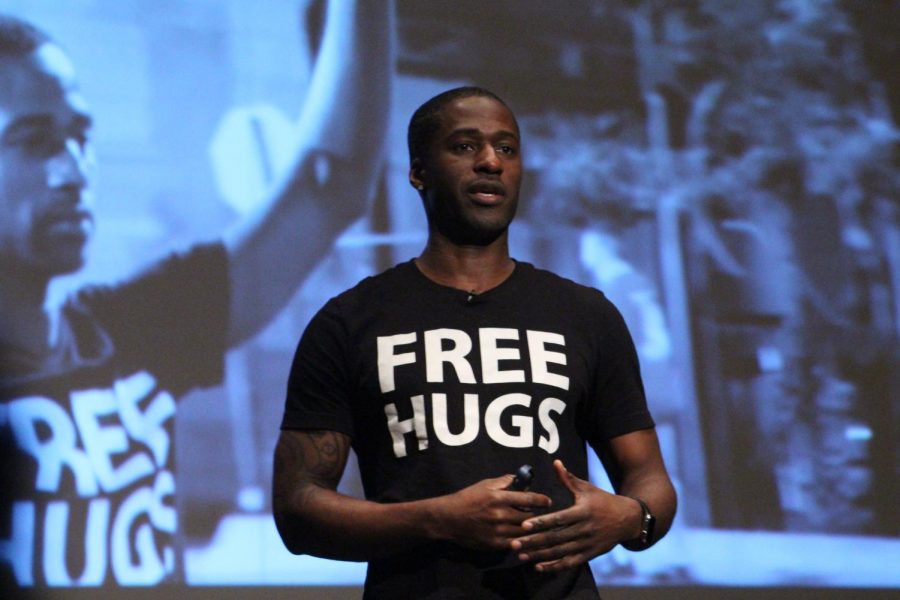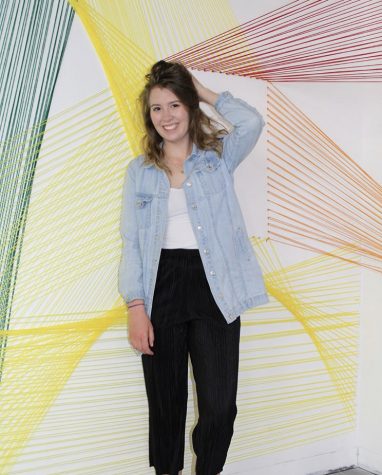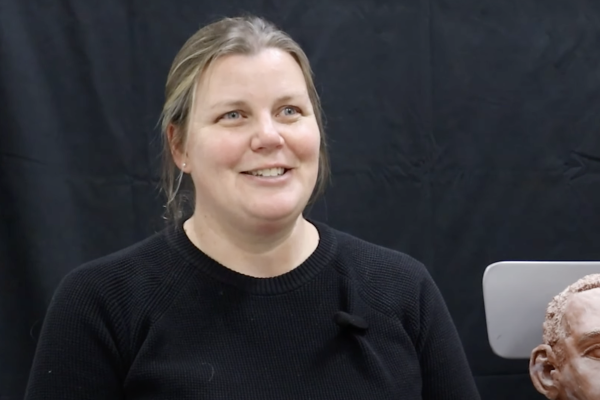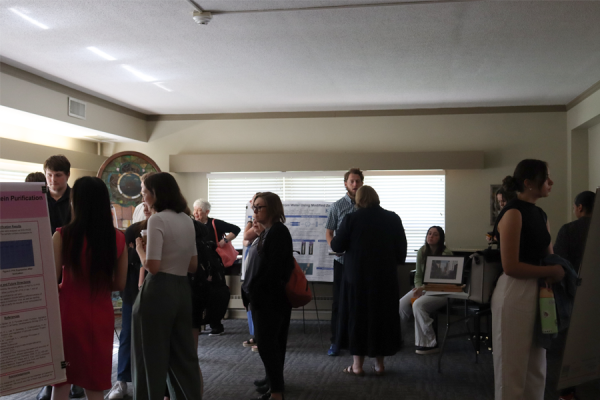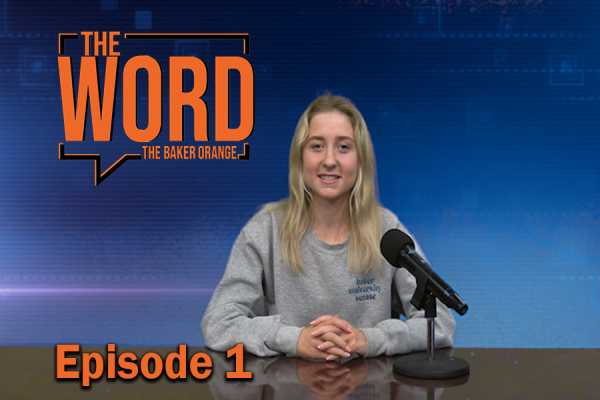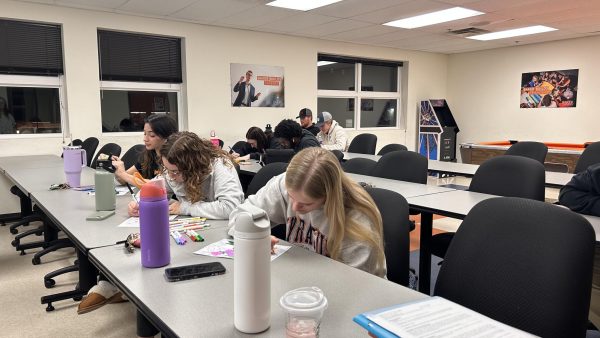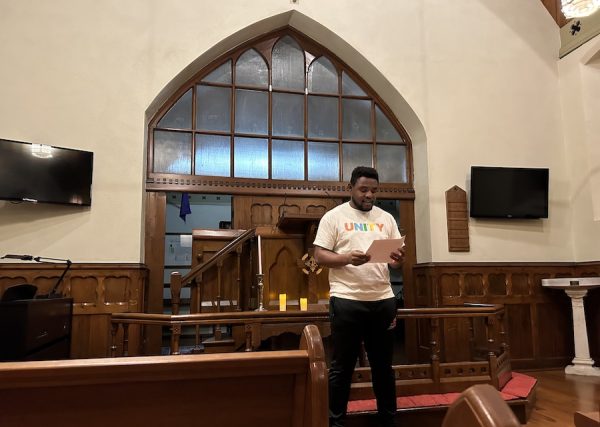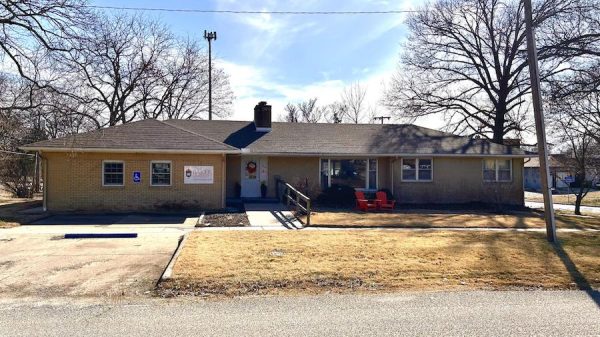Mungano and SAC host diversity lecture
Ken E. Nwadike, Jr. delivers his lecture in Rice Auditorium on Feb. 5.
February 20, 2019
Mungano, Baker’s student-run diversity organization and Student Activities Council partnered again to sponsor a diversity lecture by Free Hugs Project founder Ken E. Nwadike, Jr. on Feb. 5 in Rice Auditorium. Nwadike took the stage to present his message of peace to students in his iconic “Free Hugs” t-shirt.
The activist attends protests and riots around the U.S. to promote conversation between opposing sides and offers hugs to anyone who asks.
The Speech
Nwadike started at the beginning of his story. The activist described his past and his experiences living in a homeless shelter with his mother and four siblings in Los Angeles. As a child, he witnessed the Rodney King riots. Nwadike credits the riots to making him comfortable doing what he does now.
Once he reached middle and high school, a coach discovered Nwadike had a talent for running. From the very beginning of his running career, people took notice and out of college he ran with the elite Nike Farm Team in the 1-mile.
While running for Nike, Nwadike was volunteering at the local homeless shelter. Soon he realized that helping others was his passion. After a lot of fundraising, Nwadike combined his two passions and started the Hollywood Half Marathon to benefit homeless youth in Los Angeles.
After the Boston Marathon Bombing in 2013, Nwadike continued to follow his passion for running and service by starting a campaign to get as many people as possible to sign up for the race the following year. After missing the Boston qualifying mark by 11 seconds, Nwadike decided to still attend the race. Instead of running, he offered free hugs to runners. He decided to film all the hugs, and the video went viral.
Nwadike began explaining the transition from giving out hugs at races to doing so at protests. It became less about hugs and more about creating dialogue between protesting groups, he said.
Baker students were able to see through the videos that Nwadike takes at protests the intensity of the situations.
Nwadike’s final message was to encourage students to really get to know each other and bring people that are different from you into your life. Nwadike opened up for questions at the end of his lecture. Students were engaged and posed thought-provoking questions regarding how to teach people to love, how he builds up the courage to do what he does and how he takes care of himself. Nwadike was very passionate and responsive about the questions students posed and stayed around to interact with students afterward.
“I hope that they [Baker students] take away the ability to empathize with people that aren’t like them,” Coordinator of Inclusion & Wellness Education Paul Ladipo said. “That empathy is what brings us all together.”
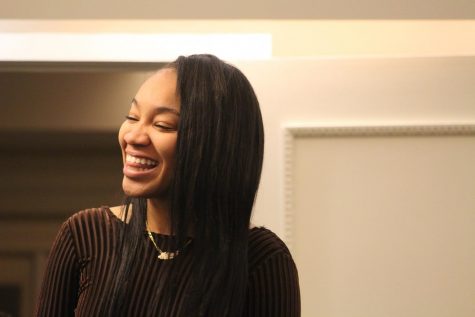
Sophomore Na’tori Nelson introduces herself at the dinner Student Activities Council and Mungano hosted on Feb. 5.
The Future
What can we expect from Nwadike in the future? Be on the lookout for his third full-length documentary titled “Anarchy: Standing Between Police and Antifa.” The documentary follows the protests of the left-wing militant group Antifa at various riots throughout the United States. Nwadike believes the media gives Antifa “a bad rep,” and he explained how he is ultimately reaching for the same goal: to create change.
Nwadike’s choice to create this film was to counter documentaries on extreme right-wing groups like “White Right: Meeting the Enemy” and the Netflix documentary “Alt Right: Age of Rage.” He believes there needs representation for both sides.
Besides creating his documentary, Nwadike has been dabbling in other areas, from producing to politics. As Nwadike sees it, speaking to young people is where his main focus lies.
“There are a lot of kids who think that people who matter don’t care about them,” said Nwadike.
Nwadike tries to combat this by spending time with students and engaging them in deep conversations. He wants to be the person he wished he had while growing up.
“Other people need exactly what I needed, and now I am in a position to be that for them,” Nwadike said.
Nwadike is much more than just a role model for some people: in recent years, many college students have asked him to run for president. At first, Nwadike did not give the idea much thought, but after the 2016 election, he realized that candidates do not have to be career politicians. He filed with the Federal Election Commission because he feared that there would be no Democratic candidate with a high moral character to oppose Trump in 2020.
Although he is listed as a presidential candidate for the 2020 election, Nwadike says he has not put much effort into his campaign. His current strategy is to lay low and let the other candidates “mud sling at each other” until he feels it is necessary to join the race.



